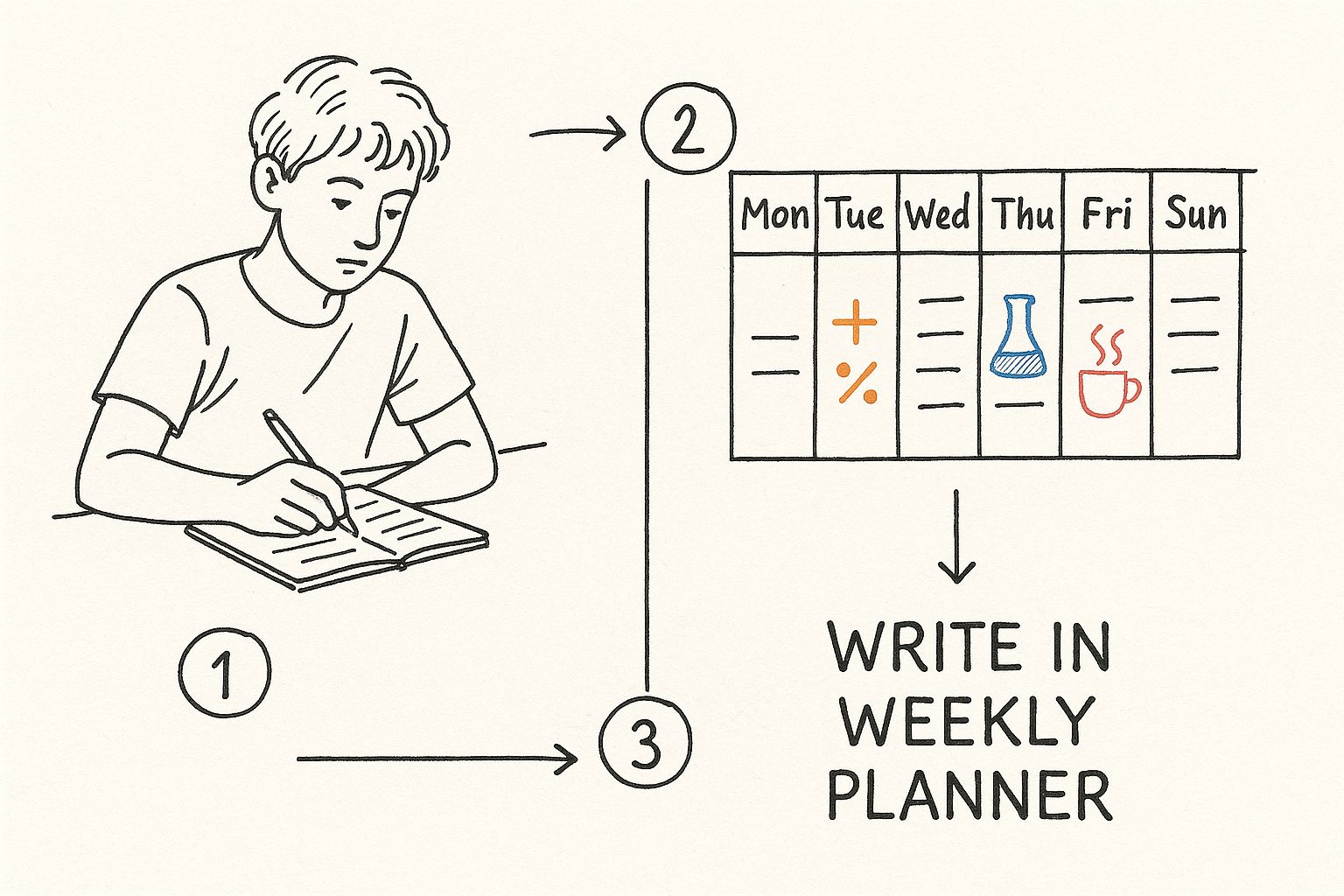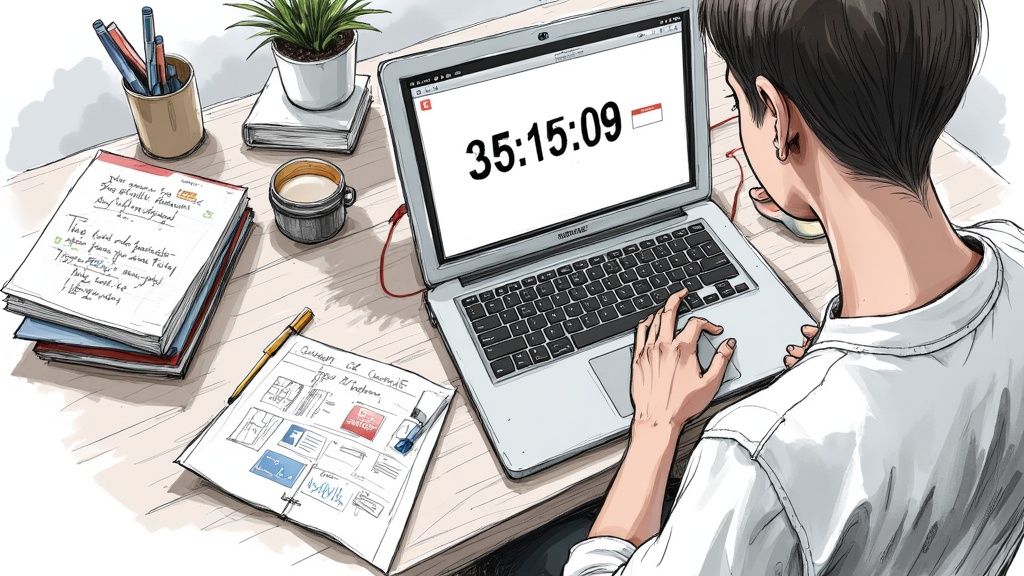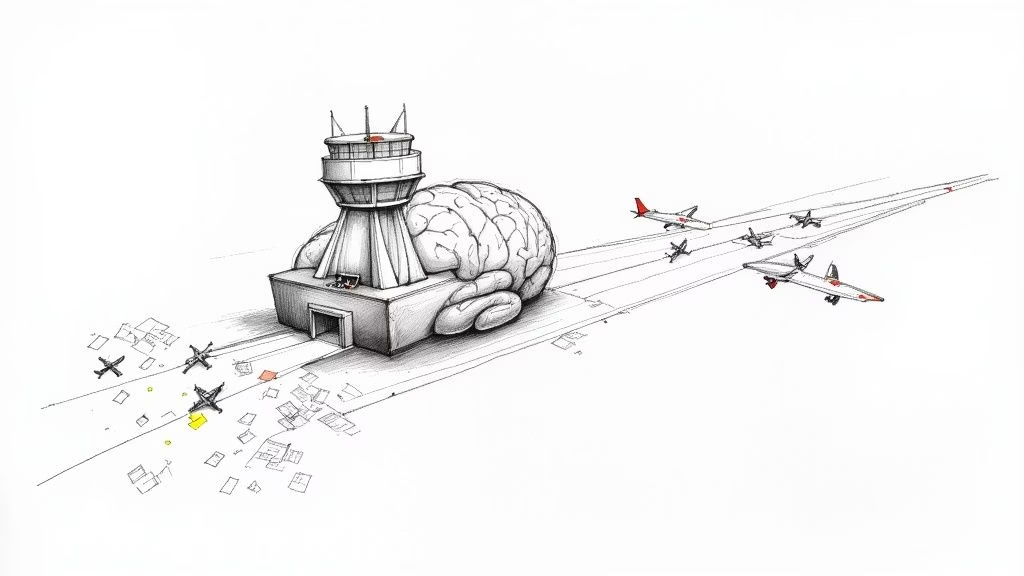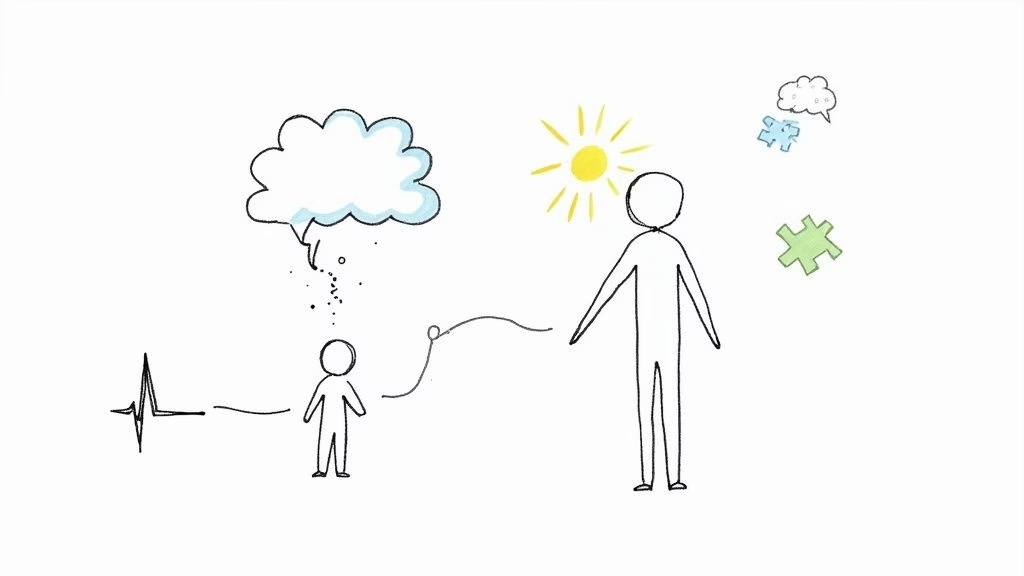Let's be real: telling a teenager to "just get a planner" is advice that usually lands with a thud. It’s not that they don't want to get organized; it’s that this old-school advice completely misses the point of what it’s like to be a teen today. They’re juggling a world of intense academic pressure, a packed schedule of extracurriculars, and a social life that literally never logs off.
Traditional time management was built for a different era—one without the constant buzz of notifications or the endless scroll of a social media feed. The real challenge for modern teens isn’t a lack of trying. It's that they need a completely new playbook, one that actually fits the world they live in.
Before we dive into solutions, let’s get on the same page about the challenges. Modern teens are up against a unique set of hurdles that can make managing time feel like an uphill battle. This table breaks down some of the most common ones.
Common Teen Time Management Hurdles
| Challenge | What It Looks Like | Why It's a Problem |
|---|---|---|
| Digital Distractions | Constantly checking notifications, getting lost in social media feeds, and multi-tasking between homework and online chats. | It fragments focus, reduces the quality of work, and turns a 30-minute task into a two-hour ordeal. |
| Over-Scheduling | A calendar packed with school, sports, clubs, a part-time job, and social commitments, with little to no downtime. | Leads to burnout, stress, and a feeling of being constantly overwhelmed. There’s no room for rest or spontaneity. |
| Procrastination | Putting off big projects or studying until the last minute, often driven by anxiety or feeling overwhelmed by schoolwork. | Creates a cycle of panic, rushed work, and poor results, which only reinforces the anxiety for next time. |
| Lack of Motivation | Feeling uninspired or unsure about long-term goals, making it hard to see the point of daily school tasks. | Without a clear "why," it’s tough to find the internal drive to push through boring or difficult assignments. |
Seeing these challenges laid out makes it pretty clear why a simple to-do list isn't going to cut it. We have to address the root causes, not just the symptoms.
The Elephant in the Room: Digital Distractions
The constant pull of the digital world is a massive hurdle. It's not just a hunch; the numbers back it up. A staggering 82% of people globally don't use a formal time management system, and for teens surrounded by digital noise, that gap feels even wider. When you consider that multitasking and interruptions can eat up around 28% of the average person's day, you start to see the scale of the problem. You can dig into more of these insights on how distractions kill productivity over at Clockify.me.
For teens, the lines between school, social life, and downtime are completely blurred. A quick check of Instagram while doing homework can easily turn into an hour-long scroll session. It’s not a failure of willpower; it’s the design of the technology they're using.
This isn't about blaming phones or social media. It's about acknowledging their power and giving teens the tools to manage their digital world, not just their homework schedule.
We Need More Than Planners and To-Do Lists
If we really want to help teens master their time, we have to look beyond the surface-level tools. The real work is in tackling the stuff that fuels procrastination, like motivation slumps and the very real connection between putting things off and mental health. It means providing resources that support their emotional well-being, not just their productivity.
For parents, this is a signal to shift from nagging to coaching. It’s about having open conversations about their goals, their stress, and what’s actually getting in their way. For teen boys, in particular, recognizing the unique pressures they face and connecting them with mentors or supportive groups like men's groups can make all the difference for those who are struggling.
It all starts with a dose of empathy and the understanding that the old rulebook just doesn’t apply anymore.
The Vicious Cycle of Procrastination and Teen Mental Health
We’ve all seen it. The big project is due, the final exam is days away, and your teen is doing anything but the work. It’s easy to jump to conclusions and call it laziness. But I’ve learned from years of working with teens that procrastination is almost never about being lazy.
It's an emotional reaction. It's what happens when a task feels so huge, so overwhelming, that doing nothing feels safer than trying and failing. Avoidance becomes a short-term coping mechanism for dealing with the intense pressure to succeed at school.
Think about it: a teen isn't putting off studying because they don’t care about their grades. Often, it's the opposite. They care so much that the fear of not getting it right is paralyzing. It's easier not to start at all than to face the possibility of not measuring up.
This kicks off a nasty downward spiral. The longer they put it off, the more guilt and anxiety pile up. That growing anxiety makes the task seem even more monumental, which, in turn, fuels more procrastination. It’s a loop that can absolutely crush a teen's confidence and mental well-being.
Spotting Stress-Driven Procrastination
It's critical for parents and teens to recognize this pattern for what it is—a cry for help, not a character flaw. The link between poor time management and stress is well-documented. Research from the American Psychological Association has consistently shown that teens report stress levels that rival adults', often stemming from school pressures. One survey revealed that a staggering 55% of high school students are stressed out specifically because they can't get a handle on their time.
When you pair that with the fact that roughly 75.5% of students admit to procrastinating, it becomes obvious we’re dealing with a widespread issue that directly impacts their schoolwork and their mental health.
Procrastination is often tangled up with anxiety. For many teens, it becomes a habit of avoidance that's tough to break on their own. Learning about breaking the anxiety and avoidance cycle is a great first step, as it offers some really practical advice on this front.
How to Break the Cycle and Rebuild Motivation
If you want to help a teen with teenager time management, just telling them to "get started" is like telling someone in a storm to "just stay dry." It doesn't work. The real solution lies in addressing the feelings driving the avoidance. Motivation is the fuel, and it runs on empty when a teen feels overwhelmed and disconnected from their goals.
Here’s how you can help them refuel:
- Acknowledge the stress. Before anything else, validate what they’re feeling. A simple "I get it, this seems like a lot," goes so much further than a dismissive "Just do it." This is a key parenting tip for building trust.
- Shrink the task. Big projects are intimidating. Help them slice it into tiny, bite-sized pieces. The first step should be so small it feels almost ridiculous not to do it. "Open the textbook" is a win.
- Aim for 'done,' not 'perfect.' Perfectionism is procrastination’s best friend. Give them permission to do an imperfect job. The goal is completion, not flawlessness. You can always revise a finished draft, but you can't do anything with a blank page.
"When I start with meditation everything improves."
I love this idea because it gets to the heart of the matter. You have to calm the mind before you can command it. Just a few minutes of mindfulness can lower the anxiety that fuels procrastination, clearing the way for focus and action.
For parents, the challenge is to encourage your teen without adding another layer of pressure. It’s a delicate balance. If you're searching for more ways to help, our guide on how to motivate teens is packed with actionable tips. Sometimes, especially for teen boys that are struggling, connecting them with a mentor or a positive men’s group can also provide a space where they can build confidence away from the pressures of school and home.
How to Build a Schedule That Actually Works
Let's move past the theory. This is where the real progress in teenager time management begins. The goal isn't to create a rigid, color-coded, minute-by-minute schedule that completely falls apart by Tuesday. It’s about building a flexible, personal system that actually empowers a teen, adapts to their real life, and prevents burnout before it even starts.
A great first step is a simple "time audit." For just a few days, encourage your teen to jot down where their hours actually go. There’s no judgment here, only observation. This simple exercise almost always reveals some surprising patterns, especially when it comes to screen time and digital habits.
Confronting the Screen Time Reality
A huge chunk of any modern teen's time is spent online. That's just a fact. Recent data shows the average teen spends about 7 hours and 22 minutes on screens every single day. For boys, that number can climb to over 9 hours. This isn't some kind of moral failing; it's the reality of their social and academic worlds. The key is understanding where this time goes so they can start making more intentional choices.
From Big Projects to Small Steps
Once you both have a clearer picture of where the time is going, you can start reclaiming it. Huge assignments are a major source of procrastination simply because they feel so overwhelming. The trick is to break them down into smaller, more manageable pieces—a technique often called task chunking.
Instead of a to-do list item like "Work on history paper," the goals become "Find three sources for the paper" or "Write the first paragraph." It transforms a mountain into a series of small, achievable hills, which makes it so much easier to just get started. Our guide on how to set SMART goals gives you an excellent framework for breaking down big objectives into these kinds of actionable steps: https://andrewpetrillolifecoaching.com/how-to-set-smart-goals/
To make a schedule truly stick, you have to know how to prioritize. Learning about effective priority management systems is a game-changer for helping teens identify and focus on what really matters.
The best schedules are built on flexibility. They have room for spontaneity, rest, and the unexpected things life throws at you. A good plan doesn't control your day; it liberates you from the constant stress of figuring out "what's next?"
A fantastic tool for this is the Eisenhower Matrix. It helps teens sort tasks into four quadrants based on their urgency and importance. This simple visual makes it crystal clear what to do now, what to schedule for later, and what they can just let go of.
This visual shows how a teen might realistically structure their week, balancing schoolwork with the essential breaks and personal time needed to stay sane.

This whole process isn't about restriction. It's about empowerment. It’s about making conscious choices to create a balanced schedule that actually works for them, not against them.
Finding Focus Through Mindfulness and Meditation
Improving time management as a teenager often starts in an unexpected place: not with a new planner or app, but with a quiet mind. The idea that "when I start with meditation everything improves" is so powerful because it gets to the root of the problem. A scattered, anxious mind is the real enemy of productivity.
When you're juggling school, a social life, and the constant buzz of your phone, finding a moment of stillness isn't just a nice-to-have. It’s a strategic advantage.
Mindfulness isn't about emptying your brain completely. It’s about paying attention to the present moment without judging yourself. This simple practice actually strengthens the part of your brain in charge of focus and decision-making. Just a few minutes can lower stress, kill the urge to procrastinate, and make that mountain of homework feel a little smaller.
A Simple Meditation Guide for Teens
You don't need a special cushion or a perfectly silent room. This is a simple, three-minute meditation guide for teens you can do anywhere—at your desk, on the bus, or right before you go to sleep.
- Find a comfortable spot. Sit upright in a chair, feet flat on the floor, and just rest your hands on your lap. You can gently close your eyes or just look down.
- Focus on your breath. Take a slow, deep breath in through your nose, then let it out slowly through your mouth. Don't force it. Just notice the feeling of air coming in and going out.
- Acknowledge your thoughts. Your mind is going to wander. That’s what minds do. When a thought about school, friends, or anything else pops up, just notice it without judgment and gently bring your focus back to your breath.
- Finish with intention. After a few minutes, slowly bring your awareness back to the room. Open your eyes and take a second to notice how you feel before jumping back into your day.
Think of it like hitting a reset button for your brain. That brief pause allows you to think more clearly and figure out what actually matters.
Connecting Focus with Action and Support
Mindfulness is how you build the internal skill to manage your attention, but having external support is just as important. For a lot of teen boys, especially those who are struggling, finding a community can be a complete game-changer. Joining men's groups or finding a mentor gives you a safe place to talk about challenges and build resilience away from the pressures of school.
Mental clarity is the foundation of effective action. When a teen learns to quiet the internal noise, they are better equipped to handle the external demands of school and life.
Of course, a big piece of this is dealing with digital distractions head-on. There are practical ways to manage this, including learning some easy steps to block distracting websites.
When you combine an internal practice like mindfulness with smart external strategies and a solid support system, you create a powerful approach to managing not just your time, but your own well-being.
A Practical Guide for Parents and Mentors
Supporting your teen as they learn to manage their time is a team effort, but your role has to change. These parenting tips are designed to shift your role from manager to coach. This means you stop giving orders and start asking guiding questions, helping them find their own solutions instead of just handing them yours.
Productive conversations are everything here. Instead of the classic, "Did you do your homework?" try something like, "What’s your plan for getting that history reading done tonight?" That small tweak changes the entire dynamic. It's no longer an interrogation; it's a collaborative huddle. It shows you trust them to take the lead on their own life.
When they set their own goals and figure out the logical consequences for not meeting them, the system becomes theirs. And when they own it, they're so much more likely to actually follow through.
Model the Habits You Want to See
Teens have a finely tuned radar for hypocrisy. They see everything, especially when your words don't match your actions. If you want them to manage their time well, you have to show them what that looks like in real life.
That means putting your own phone away at the dinner table. It means sticking to your schedule and being transparent about how you prioritize your own overwhelming to-do list or deal with stress.
By modeling these habits, you're giving them a real-life blueprint to follow—one that’s far more powerful than any lecture you could ever give. Admitting when you're struggling with procrastination or feeling overwhelmed can also be a game-changer. It normalizes their own feelings and opens the door for a more honest conversation.
Resources for Young Men and Teen Boys
For a lot of teenage guys, the pressure can be intense. Juggling school, social expectations, and figuring out who they are is a heavy lift. Sometimes, the best support comes from someone outside the immediate family—a positive role model or a community of guys who just get it. Here are resources for young men and teen boys that are struggling:
- Mentorship Programs: Organizations like Big Brothers Big Sisters or local community centers can connect them with a reliable, positive adult who isn't a parent. These programs provide invaluable guidance on motivation and life skills.
- Men’s Groups: There are groups out there focused on healthy masculinity and emotional intelligence, like programs from The ManKind Project or Next Gen Men. They create safe spaces for boys to talk about real challenges and build resilience.
- Skill-Based Groups: Things like team sports, coding clubs, or martial arts do more than just teach a skill. They build discipline, confidence, and a sense of belonging with peers who share the same interests.
When a young man finds a community where he feels understood and supported, his motivation and self-esteem can flourish. It provides an environment where he can learn valuable life skills, including time and stress management, from mentors he respects.
The link between a teen's stress levels and their ability to manage a schedule is undeniable. If you need more strategies on that front, check out our guide on stress management for teens. Finding the right outlet is a crucial piece of building a solid foundation for success.
Your Questions on Teenager Time Management Answered
Let's dig into some of the most common questions I hear from teens and parents. This isn't just a list of answers; it's a way to reinforce the practical ideas we've been talking about.

How Can I Motivate an Unmotivated Teenager?
This is a big one. Motivation usually tanks when a teen feels totally overwhelmed, disconnected from their goals, or just plain scared of failing at school. Piling on more pressure almost never works. Instead, try shifting your role from a manager to a coach.
Start by just acknowledging how they feel. A simple, "I get it, this seems like a lot," can completely change the dynamic and open the door to a real conversation.
From there, help them break down a massive task into tiny, almost silly, steps. The first step should be so small it’s hard not to do it, like "open the textbook to the right page." This creates a little bit of momentum and helps short-circuit the procrastination that’s killing their drive.
What Are Some Mental Health Resources for Teens?
Real talk: you can't manage your time if you can't manage your mind. When stress or anxiety takes over, focus is the first casualty. Here are a few solid resources and research for mental health for teens:
- The Jed Foundation: This organization has incredible resources and support focused on teen mental health and suicide prevention. Their research provides valuable insights for parents and educators.
- Teen Mental Health.org: They do a great job of offering clear, accessible information on mental health disorders to help teens and their families understand what's going on.
- The National Institute of Mental Health (NIMH): A leading source for research on adolescent mental health, offering data and treatment information for conditions like anxiety and depression.
Finding a community is especially powerful for teen boys who might be struggling. Men's groups or mentorship programs designed for young men can offer a unique space to build resilience and confidence away from the usual pressures of school.
The core idea is simple: when I start with meditation, everything improves. Introducing a teen to mindfulness practices can be a game-changer for managing the anxiety that fuels procrastination and drains motivation.
How Do I Start a Simple Meditation Practice?
Meditation isn’t about emptying your mind—that's impossible. It’s just about paying attention to right now, without judgment. Here’s a super simple meditation guide for teens to get started:
- Find a comfortable spot to sit upright. No need for a special cushion, the edge of a chair works great.
- Focus on the breath. Just notice the feeling of air moving in and out of your body.
- Acknowledge thoughts when they pop up (and they will). Don't fight them, just notice them and gently bring your focus back to your breath.
Even just two or three minutes a day can be a powerful reset. It calms the nervous system and sharpens focus. Think of it as a brief pause that helps them approach schoolwork and everything else with a clearer, less reactive mind. It’s a practical skill for managing both their time and their well-being.
Figuring out motivation, focus, and time management is a journey, not a quick fix. If you're looking for personalized support to help your teen build these essential life skills, Andrew Petrillo Life Coaching offers a structured, one-on-one approach. Learn how coaching can empower your teen to transform overwhelm into action.



















